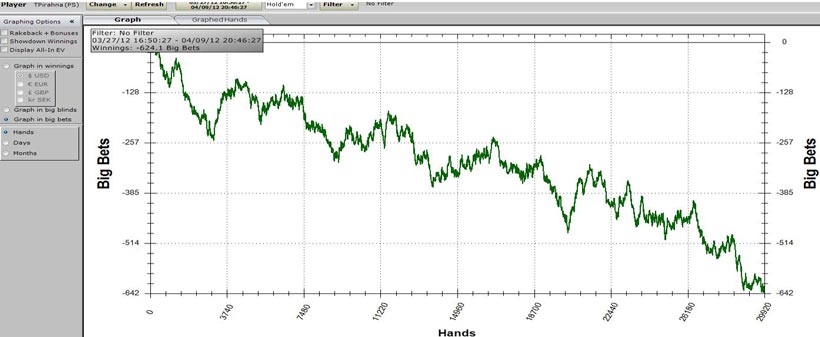Dealing with a downswing in poker isn't always easy, and you shouldn't try to do it completely on your own. Take some time off and get back on track.
 One of the tougher things that we will have to go through as poker players is dealing with a downswing that lasts.
One of the tougher things that we will have to go through as poker players is dealing with a downswing that lasts. In many cases, the issue is not just about the money we lose. It’s about the loss of future profitability at the tables. It’s about the loss of all the money we could have made,
if we were still a winning player.
A huge dark cloud can begin to appear over our future. Are we really still a winning player or are we just deceiving ourselves? Has poker finally got to the stage where it’s a rake trap and essentially unbeatable? What will we do if it turns out that we can no longer make money at the tables?
Self Propogating

An important concept to understand is the idea that downswings are “self propagating”. This is the same as saying that they can have a “downward spiral effect”.
The idea is that assuming we are initially winning players, we are playing a good game, and our
downswing is caused purely by variance. That causes us to maybe get a little tilted, or a little doubtful about our abilities.
The negative impact on our mindset causes us to play slightly worse than usual. The swing continues as a result. Perhaps we would have even been out of the swing by now, but since we allowed it to affect our mindset,
it is turning into a much bigger swing than it needed to be. We may reach the stage where we are logging on to our poker client expecting to lose. While it’s important to acknowledge that our state of mind cannot have any bearing on the cards we are dealt, thinking that we will lose can cause it to become a reality. We might face a decision where folding is correct but we decide to shove thinking “It doesn’t really matter what I do. I’m destined to lose anyway, so what value is there in thinking deeply about the correct decision?”
Downswings are Useful

Out of all of the terms we might use to describe a downswing,
useful is probably the last thing that comes to mind. It is important as poker players to develop a relationship with failure that is healthy and allows us to grow. The truth is that
many players will forget to work on their game when they are running good. It’s common to stop questioning why we make certain plays and whether they have the highest expectation. Losing a decent chunk of money can present us with a unique opportunity to grow.
Rather than allow a downswing to result in negative emotions, it should spur us to work even harder on our game. By the time we navigate our way out of the swing we’ll be a much better player for it.
The most successful companies in today’s world are in part successful because they understand the importance of this. A commonly cited
quote by businessman Thomas J. Watson, chairman and CEO of IBM -Would you like me to give you a formula for success? Its quite simple, really. Double your rate of failure. You’re thinking of failure as the enemy of success. But it isn’t at all….you can be discouraged by failure, or you can learn from it. So go ahead and make mistakes. Make all you can. Because, remember that’s where you’ll find success. On the far side. Causes of a Downswing

We mustn’t assume for a minute that all downswings are caused by a failure in our application of poker strategy at the tables. An important idea when facing a downswing is to break down our losses into three categories.
- Variance
- Bad Play
- Bad Mindset
It makes sense to try and assign a probability to each of these factors. For example “I think my swing was cause 60% by variance, 30% by mindset, and 10% by strategic adjustments that I need to make in general.
1. Variance – Assuming we are playing well and have a great mindset, then there is nothing that we can do about negative variance. Rather than attempting to control the variance which is somewhat impossible, our approach should be to
make peace with the fact that poker is a game that entails huge variance.
Most of the reasons why players struggle to cope with downswings is a result of unrealistic expectations about the game. If we’ve ever played around with a variance simulator we’ll know that the potential swings we might go on even as a winning player are huge. So when that swing happens, we should typically accept it as part of the game. Most players underestimate variance and will assume that they are cursed, or the site is rigged, or that they must be doing something terribly wrong.
If we are expecting swings as large as 20bi then we won’t necessarily be as disturbed when it finally happens.
Education is the key to helping us regulate our mental state. When we find ourselves in a swing caused primarily by variance
we have no choice but to ride it out, maybe even moving down stakes if our bankroll dictates. There are other pieces of logic we must keep in mind to help us retain our sanity. For example, we should know that one of the primary reasons why poker is a profitable endeavor is because of the variance. There is not a good chance that recreational players would keep hitting the tables to donate their money if they didn’t occasionally go on lucky streaks where they win!
 2. Bad Play – The truth is that many downswings involve some level of bad play. It’s not always the case, but as we mentioned earlier, running bad can have a downward spiral effect. So even if we are making good plays initially, the pressure our downswing exerts on us may cause us to make some questionable plays. Downswings themselves are unavoidable, but sometimes not prolonging our downswing as a result of bad play is something that we actually have control over.
2. Bad Play – The truth is that many downswings involve some level of bad play. It’s not always the case, but as we mentioned earlier, running bad can have a downward spiral effect. So even if we are making good plays initially, the pressure our downswing exerts on us may cause us to make some questionable plays. Downswings themselves are unavoidable, but sometimes not prolonging our downswing as a result of bad play is something that we actually have control over.
In this case, we are not talking about mental issues as such,
but specific strategic errors. We need to
retrace our recent database looking for problems in our strategic thinking. It may be that we are swinging down because a certain situation where we make a bad play has been cropping up more frequently than usual and hence having a larger impact on our overall results than it does normally.
The best thing we can do in any downswing situation is to assume that it is a result of our bad play and not a result of variance until proven otherwise.
It’s true that many swings are caused primarily by variance but we want to be careful of using variance as an excuse. There are some players out there who are consistent losing players, but rather than make the needed strategic adjustments to their game,
they blame variance and assume things will take a turn for the better in the future.
3. Mindset – While mindset usually does not cause downswings initially, it’s the number 1 culprit in extending our downswing across a way longer period than it needs to be.
Like the strategic side of things, our mental state needs to be monitored and trained over a significant period of time. Rather than blaming our downswing on bad mindset, we should attempt to isolate the specific problems with our mindset that are prolonging our swing.
To give an example, perhaps losing to recreational players make us feel angry. It’s important to remind ourselves that -
 The recreational players must suck out some of the time, it’s mathematically certain. Also if they did not win occasionally, there would be no weaker players left for us to profit from.
The recreational players must suck out some of the time, it’s mathematically certain. Also if they did not win occasionally, there would be no weaker players left for us to profit from.
Or perhaps we get concerned that we might no longer be a winning player, and this affects the strategic aspects of our decision making. It’s important to remind ourselves that -
- Poker is a game of uncertainty. Rather than striving for certainty we must accept that there will always be some unknown variables. All we can do as poker players is work very hard on our game and increase the probability that we are winning players in the long term.
It's also important to identify specific features of our strategic game that disappears when our mindset becomes bad. For example perhaps we notice some of the following subtle changes occurring -
- We become more tight and passive than usual
- We become more aggressive than usual
- We play longer sessions than usual in an attempt to make money back
- We start to make specific strategic errors such as 3betting in the wrong spots
- Freezing in certain spots rather than being able to think rationally (common)
Understanding exactly how our mindset affects our strategic decisions can help us to identify much sooner when we are suffering from a poor mindset. We can then make the relevant adjustments before our downswing becomes bigger.
Accumulated Tilt

Accumulated tilt is a very common problem we might experience when suffering a large downswing. When most players sit down at a table of poker they are starting at break-even. Sometimes when a player has been swinging down for a while they lose that feeling of being break. Instead of starting at zero they have the pressure of all of their previous losses weighing on their mind. They feel as if they are actually starting each game down 20 buyins.

Even if we manage to sit down at the table initially with a good mindset,
the build up of losses can make our mindset a lot more brittle. Perhaps in the past we would have been able to take several bad beats and shrug it off, but now even one bad-beat can send our mindset spiralling out of control. Here we go again, this is how it starts. Every time….I’ll probably lose another 10 buyins now.
In order to break out of this vicious cycle we need to reset our consciousness so that we are starting with a fresh slate and from break even. We should be able to do this in many cases by simply regulating our mental state. Ideally we tell ourselves the following…The money that I have lost is gone. My current bankroll is what it is now….there is no use thinking of what it might have been if I had run good. Nothing that has happened before really matters now and I need to start today afresh, as if I’m starting my poker career from scratch This is how it should work in theory, but it may be that we have not currently trained our mindset well enough to make simple adjustments in our psyche by simply reminding ourselves of logical statements. If this is the case there are a couple of useful tricks we can use to deceive our brain into thinking the above. - Deposit and play on a new room with a new bankroll (even if it’s a smaller roll)
- Take a break from poker
It's amazing how a few days off can really change our mental outlook. Playing on a new room can also convince our brain tentatively that “things might be different now”.
Ideally we shouldn’t need to do either of the above, it depends completely on how far our mindset has progressed. If we have never given our mindset any proper training then these literally might be the only options,
but we should strive to create a stronger mindset for the future so that dealing with a downswing becomes easier. More Top Rated Content
More Top Rated Content
ArticlesCoaching Videos

 Out of all of the terms we might use to describe a downswing, useful is probably the last thing that comes to mind. It is important as poker players to develop a relationship with failure that is healthy and allows us to grow. The truth is that many players will forget to work on their game when they are running good. It’s common to stop questioning why we make certain plays and whether they have the highest expectation. Losing a decent chunk of money can present us with a unique opportunity to grow. Rather than allow a downswing to result in negative emotions, it should spur us to work even harder on our game. By the time we navigate our way out of the swing we’ll be a much better player for it.
Out of all of the terms we might use to describe a downswing, useful is probably the last thing that comes to mind. It is important as poker players to develop a relationship with failure that is healthy and allows us to grow. The truth is that many players will forget to work on their game when they are running good. It’s common to stop questioning why we make certain plays and whether they have the highest expectation. Losing a decent chunk of money can present us with a unique opportunity to grow. Rather than allow a downswing to result in negative emotions, it should spur us to work even harder on our game. By the time we navigate our way out of the swing we’ll be a much better player for it. 
 2. Bad Play – The truth is that many downswings involve some level of bad play. It’s not always the case, but as we mentioned earlier, running bad can have a downward spiral effect. So even if we are making good plays initially, the pressure our downswing exerts on us may cause us to make some questionable plays. Downswings themselves are unavoidable, but sometimes not prolonging our downswing as a result of bad play is something that we actually have control over.
2. Bad Play – The truth is that many downswings involve some level of bad play. It’s not always the case, but as we mentioned earlier, running bad can have a downward spiral effect. So even if we are making good plays initially, the pressure our downswing exerts on us may cause us to make some questionable plays. Downswings themselves are unavoidable, but sometimes not prolonging our downswing as a result of bad play is something that we actually have control over.
 The recreational players must suck out some of the time, it’s mathematically certain. Also if they did not win occasionally, there would be no weaker players left for us to profit from.
The recreational players must suck out some of the time, it’s mathematically certain. Also if they did not win occasionally, there would be no weaker players left for us to profit from.
 Even if we manage to sit down at the table initially with a good mindset, the build up of losses can make our mindset a lot more brittle. Perhaps in the past we would have been able to take several bad beats and shrug it off, but now even one bad-beat can send our mindset spiralling out of control. Here we go again, this is how it starts. Every time….I’ll probably lose another 10 buyins now.
Even if we manage to sit down at the table initially with a good mindset, the build up of losses can make our mindset a lot more brittle. Perhaps in the past we would have been able to take several bad beats and shrug it off, but now even one bad-beat can send our mindset spiralling out of control. Here we go again, this is how it starts. Every time….I’ll probably lose another 10 buyins now. More Top Rated Content
More Top Rated Content

